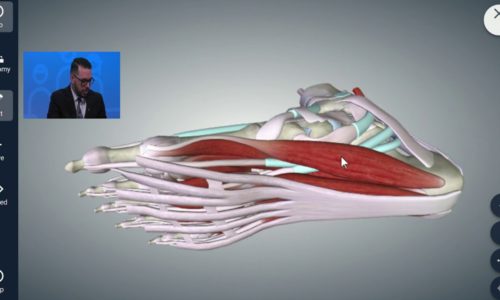We were talking a little bit about the disk replacement, what exactly doctor is alternate the disk replacement the procedure?.> Remember we discussed that approach to the spinal canal, -right here,- so and remember I said that the old way of doing it was to put a metal plate with some screws that stops motion, now instead of doing that, the new technology includes a removal of the disk in the most sparing way possible, and then replacing that disk with a metal prosthesis that allows normal motion, now the prosthesis is made out of cobalt chrome and molybdenum alloy, that’s the metal component, so it’s not going to interfere with an MRI, it’s not gonna ring in the airport, and then there’s a plastic piece that’s made out of high molecular weight polyethylene, now these are the same parts that now have over 40 years of track record in the total hip, now the total hip sees five times the body weight at times, where’s the net prosthesis only sees the 30 pound head, so the results of long-term studies have been really very promising.> Every story is different when it comes to that spine, I’ve heard of people saying yeah I’ve got this disc here and it’s been bothering me but I have no pain, and then I’ve hear other people that say yeah you know and I’m terrible pain, every person is different. > Absolutely, but look, it’s important to say number one that few patients need surgery, number two few back problems are dangerous, very few, so sometimes I’ll hear patients say well I was told that if I don’t have surgery I’m gonna be paralyzed, and 99.9 percent of the time that is not true, so it would be really important to follow the studies and actually it’s a great paper at a yell published a few years ago, where they looked at patients who were in car accidents who already had some nerve compression, none of those patients were paralyzed, disproving this old myth that open if you have nerve pain if, you fall you may be paralyzed, that is not true.








